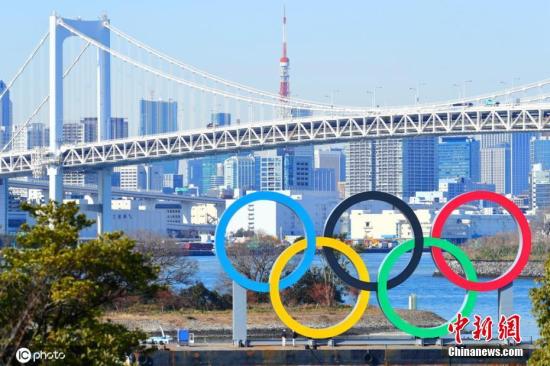China News Service, Beijing, May 17 (Reporter Zhu Chenxi and Xing Chong). It is less than 100 days since the opening of the Tokyo Olympics on July 23. However, the epidemic situation in the world has not been effectively contained, and the domestic epidemic situation in Japan is equally severe.
Where will the Tokyo Olympics, once hoped to light up the "light at the end of the dark tunnel"?
Data map: On February 10, local time, Odaiba Seaside Park, Tokyo, Japan displayed the Olympic rings to welcome the upcoming Tokyo Olympics.
Weak prevention and control, Japan "becomes embarrassed on all sides"
The number of confirmed cases in Japan is still high.
According to statistics from the Japan Broadcasting Association (NHK), as of May 15, Japan’s daily increase in confirmed diagnoses has exceeded 6,000 cases for nearly a week.
The Japanese government decided on the 14th to include Hokkaido, Okayama and Hiroshima prefectures in the scope of emergency implementation following the six regions including Tokyo and Osaka.
At the same time, the progress of vaccination in Japan is still slow.
According to the report, Japan ranks 100th in the global new crown vaccination rate. As of the 11th of this month, the population who has received at least one dose is only 2.91%, which is far behind other developed countries.
Under this situation, the Japanese people's voices against hosting the Olympics are rising.
Not long ago, well-known lawyer Utsunomiya Kenji initiated the "Petition for Suspension of the Tokyo Olympics" and has collected more than 360,000 signatures.
According to the latest poll by Kyodo News, 59.7% of the respondents hope to "suspend the Tokyo Olympics."
Many people in the Japanese business community expressed pessimism.
Hiroshi Mikitani, the founder of the Rakuten Group, said that holding huge international events is very dangerous when Japan's domestic vaccination is very inadequate.
Sun Zhengyi, president of Softbank Group, believes that at the time when the international and Japanese epidemics are facing uncertainty, whether the Tokyo Olympics can be held needs to be questioned.
The opposition parties in Japan also frequently voiced opposition.
Yukio Edano, the head of the Japanese Cadet Party, pointed out that it is impossible to hold the Olympic Games and protect the health of the people, and urged that the Tokyo Olympics be postponed or cancelled again.
Prior to this, a mass infection occurred during the relay of the Olympic torch in Japan, which led to the cancellation of the relay on the torch in many areas and the lighting ceremony.
In addition, 45 regions have given up receiving foreign athletes for pre-match training and exchange activities.
Out of worries about the prevention and control of the epidemic in Japan, international public opinion continues to succumb to bad news.
The British "Guardian" published an article this month stating that there will be almost no winners in the Tokyo Olympics, and the influx of a large number of athletes, staff, and media is likely to cause the virus to spread further.
The Washington Post of the United States bluntly said that canceling the Olympic Games may be a difficult decision for Japan, but it can alleviate the pressure of the international epidemic.
Dilemma, facing the "thorny road"
Facing the situation of "domestic and diplomatic difficulties", the Japanese government is firm and has repeatedly stated that it will host the Olympic Games as scheduled.
Japanese Prime Minister Yoshihide Suga once again expressed his determination to host the Tokyo Olympics as scheduled on the 13th.
Tokyo Governor Yuriko Koike posted on social platforms on the 16th that he will overcome the difficulties caused by the new crown epidemic and make concerted efforts to advance preparations.
The chairman of the Tokyo Olympic Organizing Committee Hashimoto Seiko said that he will try his best to help athletes from India and other severely affected areas enter the competition.
The analysis believes that a major reason why Japan insists on hosting the Tokyo Olympics is that it has invested a huge amount of funds in the early stage.
Before the postponement last year, the budget for the Tokyo Olympics had reached 1.35 trillion yen, and the budget was increased by 294 billion yen after the decision was postponed.
Once the Tokyo Olympics are cancelled, not only will most of the funding be "flooded", Japan will also face the risk of huge compensation caused by breach of contract.
According to Japanese media reports, Tokyo has signed a host city contract with the International Olympic Committee. The International Olympic Committee can independently determine whether to cancel the Olympics, but even if it is cancelled, the IOC will not be liable for compensation.
In addition, the contract clearly stipulates that if the Olympic Games are cancelled, the host city and the organizing committee will waive the rights of compensation and damages.
On the other hand, the Japanese government's determination to hold the game has more political considerations.
Japan intends to turn the Olympics into a "Renaissance Olympics" to show the world Japan's recovery after suffering from a major earthquake and nuclear leak.
In addition, Japan will hold elections for the House of Representatives this fall at the latest, and the successful hosting of the Olympic Games has become a "political bargaining chip" for politicians.
With the epidemic in Japan still not being effectively contained, there is already a big unknown whether the Tokyo Olympics can light up the "light at the end of the dark tunnel".
It is foreseeable that the Japanese government will face a very challenging "thorny road" in running the Olympic Games.
(Finish)

